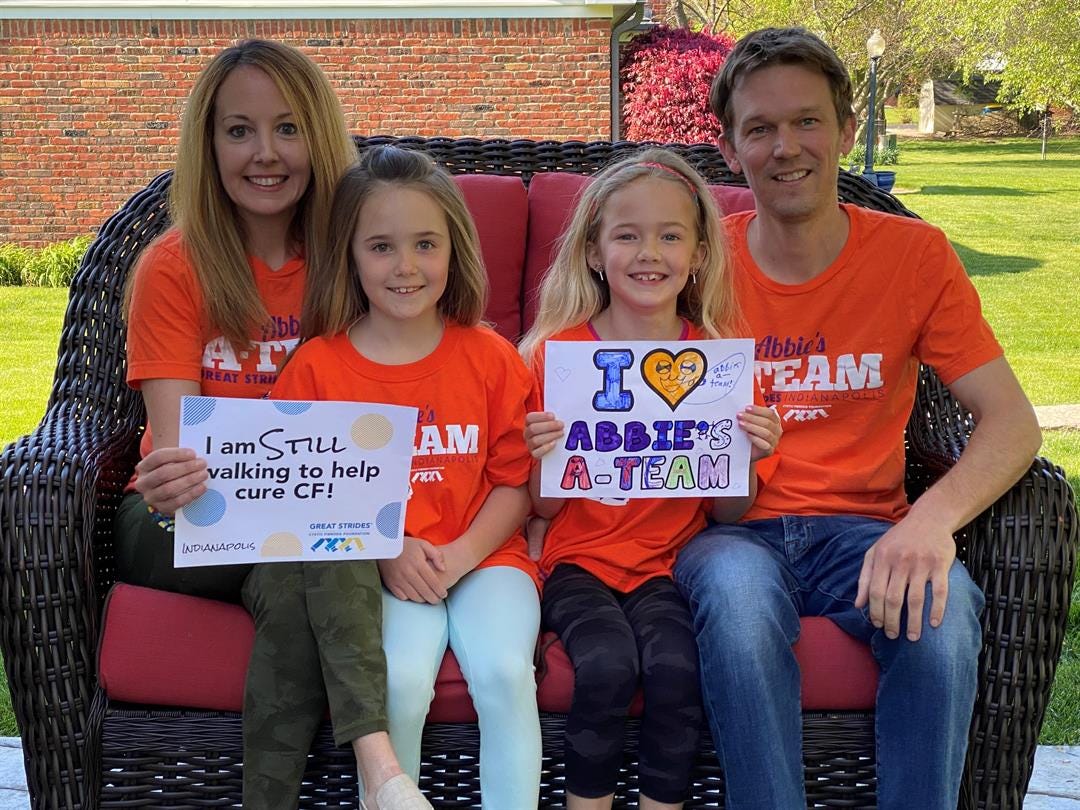IU-led Study Helps Cystic Fibrosis Patients Lighten Treatment Load
 Vollmar's quality of life improved dramatically—“like night and day
Vollmar's quality of life improved dramatically—“like night and day
Subscriber Benefit
As a subscriber you can listen to articles at work, in the car, or while you work out. Subscribe NowThe amount of time each day that Carmel resident Abbie Vollmar spends on her at-home treatments for cystic fibrosis (CF) is “intense.” For people with the life-threatening disorder that damages the lungs, daily therapies dictate hours of their day. But a miraculous advancement came in late 2019; a new drug was approved to treat CF, and people with the disease are now feeling dramatically better because of it. Anxious to break free from their bondage to daily treatment regimens, CF patients want to know which treatments they could eliminate—and how much of their day could they reclaim—while still keeping their disease in check. It’s a question that two Indiana University researchers aim to answer by leading the charge on a nationwide clinical trial.
A busy mother of two, Vollmar must carve out a minimum of three hours each day for cumbersome at-home CF therapies, such as breathing treatments and using nebulizers. The regimen helps maintain her lung function; CF is a genetic disease that affects the cells that produce mucus, causing the buildup of the thick, sticky liquid in the lungs.
“On top of the rigorous schedule of treatments, I coughed all day long, nonstop,” says Vollmar. “Sleeping through the night wasn’t possible; I’d wake up multiple times coughing. The coughing causes exhaustion and just general lack of energy all together.”
But her quality of life improved dramatically—“like night and day,” she says—within days of taking the new drug TRIKAFTA, which the U.S. Food and Drug Administration approved in October 2019 to treat the most common form of CF.
“I heard another person with CF say, ‘I feel like I’m living in someone else’s healthy body.’ That sums it up exactly,” says Vollmar. “When you’ve only known one way of living, you don’t even realize how bad you feel, because you’re so used to feeling that way. Then, you get to experience what it feels like to take much deeper breaths, to have energy—it’s a different world.”
“It’s fascinating that this is accomplished in a pill,” says Vollmar, who—like all CF patients—is accustomed to long, complicated treatments with many pieces of equipment, including nebulizers and vests that shake the chest to loosen mucus. The improvement has been so dramatic for people with CF, that it begs the question: because the drug is so effective, can patients drop some of the other cumbersome treatments?
“How much of all these other therapies can we [eliminate] and give people time back in their lives? Do they need to be doing all the other standard things they’ve been prescribed their whole lives?” says IU School of Medicine Associate Professor of Clinical Medicine Dr. Cynthia Brown, who is co-leading a nationwide clinical trial called HERO-2: Home Reported Outcomes Study.
The first-of-its kind, at-home observational study, co-led by IUSM Professor of Clinical Pediatrics Dr. Clement Ren, will take a unique approach. Unlike traditional clinical trials that involve significant back-and-forth to the clinic and meetings with research coordinators, Brown says this study is designed to be very low burden.
“It can all be done at home, because all of this information about their symptoms and how often they’re doing treatment is going to be collected through an app on their phone that should take just a couple of minutes a day to complete,” says Brown. “We don’t tell people to stop any therapy or continue any therapy; we simply want to observe people at home. What symptoms are they reporting and how are they using their treatments? Are they using their treatments every day as they used to, or are they changing some along the way? We want to get a sense of that.”
The individual patient’s information will then be linked to their own health data, so researchers can determine if their lung function is stable, if they’re able to avoid the “exacerbations” of CF that typically land patients in the hospital and track other factors that indicate how well their disease is being managed.
“The ultimate goal is to be able to say if you’re on TRIKAFTA and doing well enough—and you and your physician have had a conversation, and it seems like it makes sense for you to stop a therapy—you can feel reassured that you would not be causing harm [by dropping a therapy],” says Brown.
Vollmar says she’s not entirely dropping any daily treatments yet, but due to her “incredible” improvements since taking TRIKAFTA, she is giving herself more flexibility to skip some occasionally.
“It will certainly be very freeing to be able to say, ‘I don’t have to do this [treatment] anymore.’ At 44, I’ve gone a lifetime of only adding to my regimen, with never the thought that I can take something away. For adults with CF, it’s very surreal,” says Vollmar. “So many of the measurements for us [with CF] are quality of life. This study is going to open the door to getting a better idea of what potentially can be removed, which will even further impact everyone’s quality of life.”
Brown says the study is unique because patients can use an app on their cell phone to participate, which is a much lower commitment than usual.
Since she’s been taking TRIKAFTA, Vollmar says she’s giving herself permission to miss daily treatments occasionally when life gets in the way.
